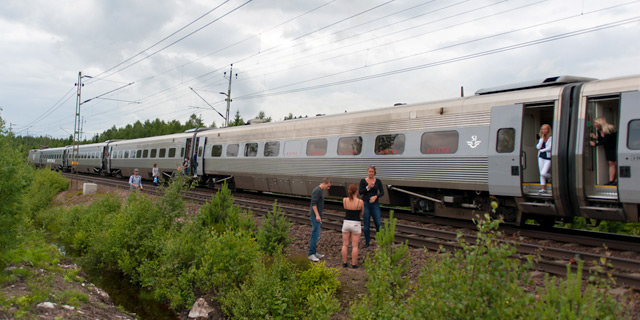In J.G. Ballards Millennium People a neighbourhood rebells as a response to the trappings of middle class life and their inability to afford more than the image of it. Their grievances are not political to begin with but relate to maintenance and parking space, and only later turn to structures of indoctrination and politics. I’m not sure that the story applies to actual mass psychology of how revolutions start, but it’s a classical Marxist notion and interesting to see it artfully applied in fiction.
At some point, a critical mass of disillusioned middle class might set themselves to start a revolution, and it might even start over something trivial.


Unrelated to politics, but related to the trappings of comfort and our societies coating of polished civility, came to my mind when I was stranded on a train recently. I was on my way to Stockholm for work when there was a loud bang and we came to a halt. Both pantographs on the train set had snagged on something and had torn, leaving us without power in the middle of nowhere. The PA doesn’t work without power, leaving the crew to rush between trying to fix whatever had broken and walking from cart to cart shouting out what little they knew. They soon gave that up though, perhaps figuring that leaving 400 passengers steaming in a train with no articulated windows or ventilation or flushable toilets would pass for “a plan.”
The cafeteria kept selling food and drink until the power went out, after which they started writing IOUs instead. They gave this up after five minutes, seeing that the queue was growing in length and annoyance, allowing people to take food and drink (“–No alcohol!”) for free. Later, in the papers, SJ’s spokesperson put it in terms of that they “distributed food and drink to the passengers” which is an odd way of saying “allowed a disorganized free-for-all once the till didn’t work.” Apparently stuff got heated once people started looting the booze. There’s a tradeoff between offering disgruntled people alcohol to placate them, and the risk of suffering their poorer impulse control afterwards.
Once the diesel locomotive had arrived and hooked up, we were off again. disembarking an hour later at Hallsberg. Parents with kids, older folks with clumsy luggage, all dragging their charges and parcels in every which way, looking for bathrooms, someone to give them information on trains or missed connections. In the hustle for soda and pork sandwiches, the din drowned out any announcement coming over the PA for how to get to Stockholm, and mostly by chance I managed to get on a train heading in the right direction. When I finally arrive it’s night, and I’m more than six hours late on a three hour journey.
What has been lost now that we are constantly being treated as customers instead of individuals with agency, is that we’re reduced to objects with demands and criteria of contentment. We’re Sims in a very boring game of TrainVille which have to be clicked on every once in a while until the workday is over. We have demands and rights, but outside of the guidebook for consumer interaction there is no way to talk or meet in a shared interest or humanity. Which leads to four anxious crew members stressing out because they have four-hundred annoyed consumers who are not getting their moneys worth of travel experience, and no way to garner sympathy once they’ve “distributed food and drink for free.” Also, some of them were impolite asshats.
Things to remember:
* Keep people informed, even if you have nothing new to say.
* Don’t be an entitled customer asshole.
* Always bring extra water and energy dense food when you’re travelling with SJ.
* Acknowledge that people have the option of ignoring what you want them to do — offer arguments as to why they shouldn’t instead of getting indignant.